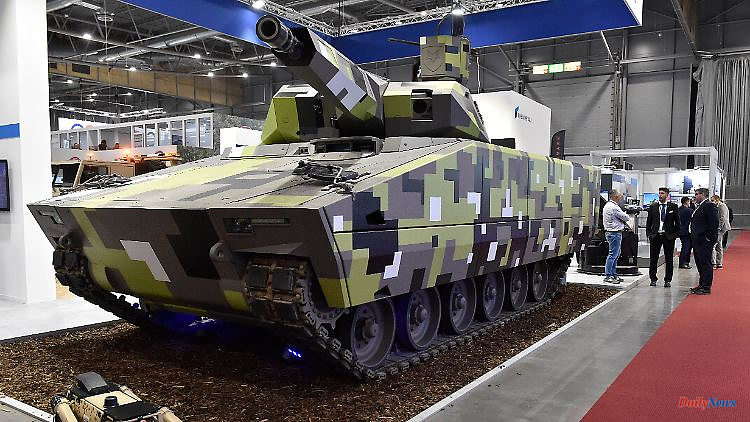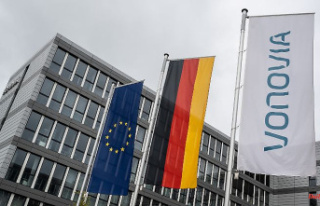Hungary does not deliver weapons to Ukraine and wants to stay out of the war in the neighboring country. Viktor Orban is by no means a pacifist - on the contrary: the Hungarian Prime Minister wants to significantly strengthen the arms industry in his own country, also with the help of Rheinmetall.
The Düsseldorf armaments giant Rheinmetall is currently building three new factories in Hungary. Tanks, ammunition and explosives are to be manufactured there - the cornerstone for an "emerging Hungarian defense industry", writes the business magazine Bloomberg. Prime Minister Viktor Orban wants to make Hungary an important arms exporter.
But not to help Ukraine. Military aid for the neighboring country would draw Hungary into Russia's war, Orban justifies his current refusal. But that doesn't mean that the Hungarians are pacifists. In any case, Budapest does not want to miss out on the lucrative war business. "The armaments industry played a rather subordinate role for the Hungarian economy. But I think that will change soon," says Andreas Bock, Hungary analyst at the think tank European Council on Foreign Relations, in the ntv podcast "Learned again" .
With the new Rheinmetall factories, Hungary's armaments industry will be significantly expanded, "on the one hand to upgrade its own army and on the other hand to export armaments to EU and NATO countries," analyzes Bock.
The armaments sector is to become a core industry of the Hungarian economy - as a second pillar, so to speak, alongside the automotive industry. According to Bloomberg, the plants of BMW, Mercedes and VW have long since become a "linchpin of the local economy". The cooperation with the German car manufacturers should serve as a blueprint for the cooperation with Rheinmetall.
At the political level, Budapest and Berlin have clashed violently several times in recent years. The EU budget, allegations of corruption and Hungary's reaction to the Ukraine war caused controversy. Away from politics, on the other hand, the "embrace between the Hungarian prime minister and German business bosses has become ever tighter," analyzes Bloomberg.
"It is obvious that beyond these quarrels there is definitely a close relationship between Hungary and the German economy," says expert Andreas Bock. "Germany is Hungary's number one economic partner, both in terms of trade and investments."
The differences between Hungary and Germany at the political level, the corruption problems and the undermining of the judiciary are apparently not a problem for the large German corporations. They are investing more and more in Hungary, especially since 2010, when Orban became prime minister again. Just last year, Mercedes and BMW announced further billion-euro investments - at a time when the EU froze funds for Hungary.
"Despite major concerns about corruption and the state of the rule of law, good location factors help attract companies. We're talking about over 2,500 German manufacturers and more than 200,000 employees in Hungary," reports Bock in the podcast. Despite all the criticism, Hungary offers big companies like Rheinmetall enormous advantages. "The comparatively low labor costs, well-trained staff, low corporate tax and state subsidies are very important."
Rheinmetall wants to invest a "three-digit million amount" in Hungary for the construction of the three new factories, the group announced. The state-of-the-art Lynx armored personnel carrier is to be produced in one of the three new factories. Hungary has ordered 218 of them from Rheinmetall. "The special feature is that the Rheinmetall factories in Hungary are a joint venture with the Hungarian state. The new plants will be operated in a joint venture with a state-owned Hungarian holding company," explains Bock. In return, the planning security is a big plus for Rheinmetall, because Hungary has directly ordered more than 200 armored personnel carriers.
Hungary pays the costs for the construction of the three new Rheinmetall plants and in return gets a share of the profits. This is the deal between the Hungarian government and the German arms giant.
The first of the new factories in Hungary is expected to start mass production in July. Ammunition for the new armored personnel carrier is to be manufactured in the other two plants from 2024. Also shells for the Leopard 2 main battle tank and for the Panzerhaubitze 2000.
It is also possible that, despite the current refusal, supplies for the Ukraine will one day be produced in Hungary of all places. Rheinmetall CEO Armin Papperger recently announced in the "Handelsblatt" that in "15 to 18 months" the Panther, a state-of-the-art, next-generation tank, will be produced for Kiev. The construction of a tank plant directly in the Ukraine is being discussed, but Rheinmetall also names Germany and Hungary as alternative production sites.
Hungary could become a kind of European armaments hub. That would be a boon for the country economically, but it could also become a problem for Prime Minister Orban. And that is when Rheinmetall produces weapons for the Ukraine in the new factories and these are then delivered to the neighboring country from Hungary of all places. Hungary's prime minister could then find himself in need of explanations on domestic policy. "If Hungary becomes a kind of weapons center thanks to these factories, you have to ask yourself whether the weapons produced there could eventually be delivered to the Ukraine," says Bock on "Learned Again."
Hungary's Defense Minister Kristof Szalay-Bobrovniczky emphasizes that production in the first year is definitely for Hungarian needs. Bock makes it clear that it is currently completely unclear whether arms will actually be shipped to Ukraine at some point. "Hungary decided at the beginning of the war not to deliver weapons to Ukraine. That is still the official position of the Hungarian government. Even if Hungary has looser export rules than Germany, for example."
First of all, Budapest and its German arms partner are about arming the Hungarian army. It is also contractually agreed. Andreas Bock thinks it is possible that instead of tanks, ammunition from the Hungarian Rheinmetall plants will go to the Ukraine as soon as production starts in the other two planned Rheinmetall factories next year.












